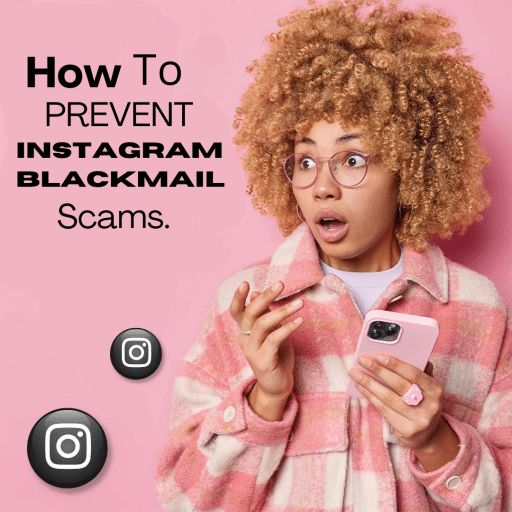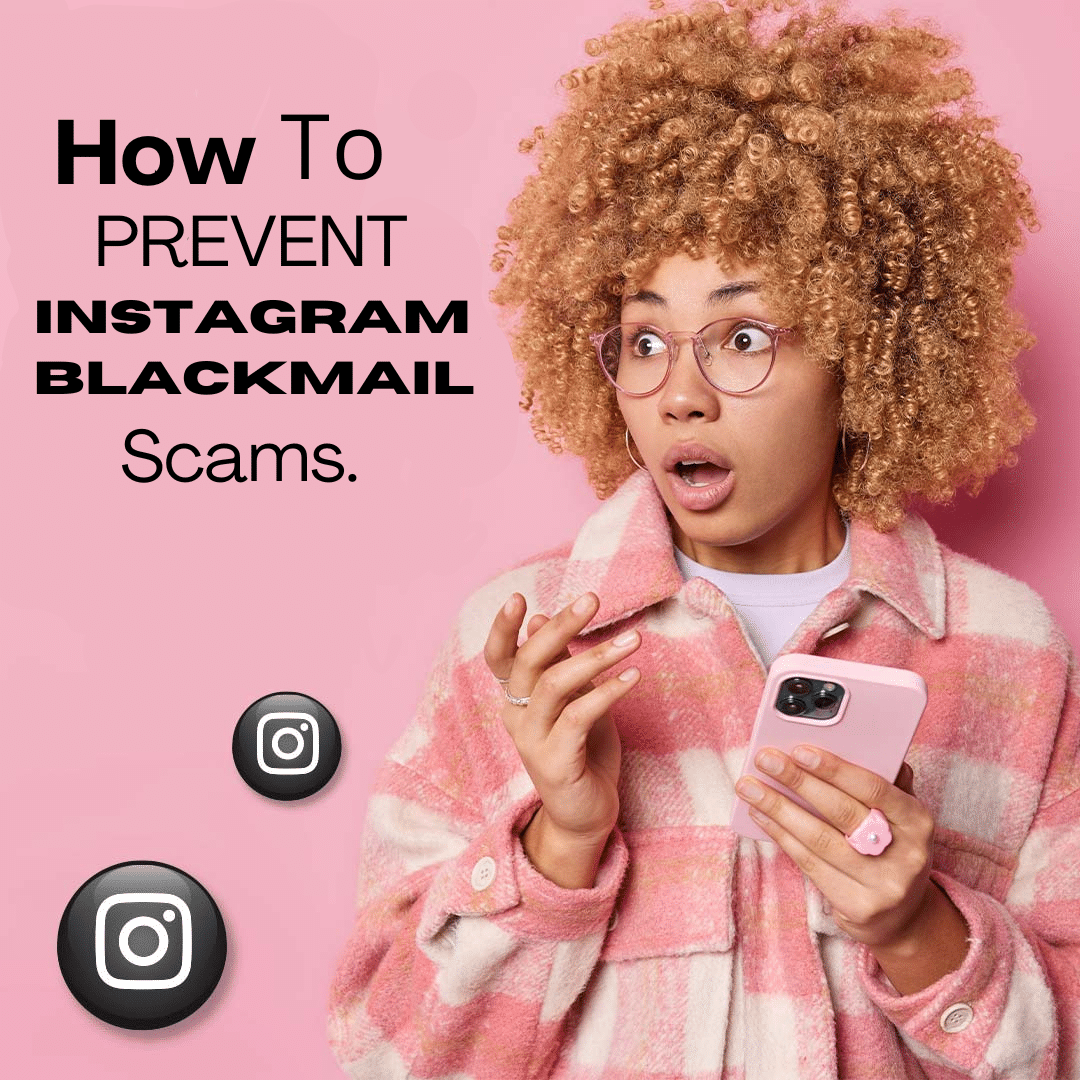Instagram is one of the largest and most popular social media platforms in the world, with over 2 billion monthly active users (1). Its massive user base, combined with the platform’s visual focus, has made it an ideal hunting ground for cybercriminals looking for new victims to blackmail. These scammers take advantage of Instagram’s accessibility and its culture of sharing personal images and information to manipulate innocent users, often with devastating consequences. In this article, we’ll explore the most common types of blackmail scams happening on Instagram in 2024, and provide key resources to help you recognize the warning signs. Our goal is to equip you with the knowledge you need to take the right steps if you ever find yourself targeted by cyber extortion.
Why Instagram Is A Hotbed for Blackmail Scams
The way users interact with each other on Instagram makes it particularly attractive to cybercriminals. The platform encourages users to connect through images, videos, and stories, fostering a sense of ease when engaging with accounts they may not recognize. Blackmailers and other cybercriminals exploit these features by targeting individuals with fake profiles, phishing attempts, and emotional manipulation, all in the hopes of extorting money from as many victims as possible.
If you’ve fallen victim to a blackmail scam on Instagram, it’s important to remember that you are not alone—thousands of people are targeted each year. Despite being a punishable crime in most countries, online blackmail is considered a multi-million dollar industry.
The Top 4 Instagram Blackmail Scams In 2023
According to a recent study by Digital Forensics Corp. (DFC), of the reported cases of online blackmail originating on Instagram 98% of the cases fell into one of four categories(2).
- Catfishing for Content: Scammers create fake profiles, often using stock or AI-generated images of attractive individuals, to lure victims into romantic or enticing conversations. Once they successfully catfish a victim, the blackmailer manipulate them into sharing some type of elicit content that shows their identity. They then threaten to leak the content if not paid, a specific type of blackmail known as sextortion.
- Account Hacking: Using malware or direct hacking techniques, blackmailers were able access the private Instagram accounts of targeted victims at which point they pulled either incriminating or embarrassing information or content that they later used to blackmail the user with the threat of exposure.
- Fake Service Scams: These particular scams involved fraudulent offers for spiritual guidance, astrology, fertility rituals, and other mystical services. In these scams, victims were coerced into sending embarrassing videos or personal information, which the scammer then used to extort them.
- Romance Scams: While similar to sextortion, romance scams aim to extort victims through requests for gifts one the idea of a romantic relationship is established. It is also important to know that according to the DFC study, 60% of romance scams turned into sextortion scams if explicit content was shared with the blackmailers account and the payment of gifts was refused(2).
What Happens If you Fall Victim To an Instagram Blackmail Scam?
Falling prey to anyone of these scams can create serious issues for victims both mentally and financially. Here are the three most common types of blackmail a victim could face in a Instagram blackmail scam.
- Sextortion: Sextortion is a prevalent form of blackmail where the scammer threatens to release intimate images or videos unless a victims pays them.
- Personal Information Blackmail: Personal Information Blackmail is a modern take on traditional blackmail where the scammers threatens to expose private information such as emails, financial details, or other embarrassing information online.
- Doxxing: A form of blackmail involving threats to release Personally Identifiable Information (PII), including personal phone numbers, addresses, workplace details, or locations of familial members, often with the intent to harm or harass the victim.
No matter the type of blackmail a cybercriminal uses to extort you, there are steps you can take to both prevent further attempts and take effective action to stop the current blackmailer.
Key Warning Signs of Instagram Blackmail Scams and How to Recognize Them
The best way to stop blackmail on Instagram is to prevent the blackmailer from ever getting the opportunity to blackmail you. Scammer profiles normally provide certain indications which can help you recognize and avoid them.
- Fake Profile Pictures & A Lack of Images: While a lack of images in an Instagram profile shouldn’t immediately prompt you to report a suspected account, you should take precautions before allowing them to follow you. If the images look fake or AI generated, take a step to complete a reverse image search of their profile and other images. This will help you verify whether they’re using a fake or stolen image.
- Suspicious Messaging: Be cautious of unsolicited messages from account that you do not know. Do not click on links from unfamiliar accounts or those you believe to be suspicious, even if they appear to be from people you know.
- Inconsistent or Generic Language: Many scammers use language that feels impersonal or generic, especially when it comes to declarations of love or affection. If the conversation feels forced or too sporadic, this is a sign that it could be a scam.
- Inappropriate Requests: If someone you don’t know starts asking for explicit content or attempts to move the conversation off Instagram to another private messaging app, it’s a major red flag. Instagram has installed certain prohibitions against the sharing of explicit content(3) which is why a scammer will try to steer you off of the app.
If any of this sounds familiar and you’re dealing with a suspicious account on Instagram, be sure to check out our free guide How To Report Blackmail On Instagram.
What to Do If You’re A Victim of Instagram Blackmail
If you find yourself being threatened with any type of blackmail or extortion through Instagram or other social media application, it is important that you act quickly. While we understand that having your reputation or well being threatened by a stranger is scary, it is important that you do not comply with your blackmailer’s demands.
Steps To Take If Threated With Blackmail On Instagram.
Do not comply with the demands of your blackmailer. While you may think that the amount requested is small, paying any amount to your blackmailer often encourages demands for additional payments.
Gather evidence of what is occurring. While you don’t need to submit the information being used to blackmail you, you’ll need to gather the messages showing the threat of blackmail. It’s best to compile these as screenshots that can easily be sent to proper authorities.
Report that scammer to the proper authorities. While the first report should be with local law enforcement, your local police may instruct you to seek additional assistance from federal law enforcement. You can also file a report with Instagram. This not only helps prevent your blackmailer from reaching out to your connections but it could help save another victim from falling victim to online blackmail.
As an added precaution, you may want to seek further assistance from a cybersecurity firm. Companies like Digital Forensics Corp. and others in the digital forensics field specialize in removing incriminating or embarrassing content, helping to eliminate the leverage blackmailers hold over their victims.
For more information on stopping Instagram blackmailers, check out our free resource: What To Do If Someone is Blackmailing You on Instagram
Protecting Your Privacy On Instagram
To reduce your risk of online blackmail, you can take these steps to safeguard your personal information when creating and using the Instagram platform.
- Set your profile to private so that only approved followers can see your posts.
- Hide stories and disable resharing options if you are not actively monetizing your Instagram.
- Remove any private or contact information from your Instagram bio.
- Avoid sexting or sending explicit content. We understand that this may be appealing but it creates several risks.
- Do not log into your Instagram on shared devices and always log out when no longer using public devices.
- Secure your account by enabling two factor authentication for an extra layer of protection.
How Digital Forensics Corp. Can Help Victims of Instagram Blackmail
If you’ve been targeted by an Instagram blackmail scam, Digital Forensics Corp. can offer crucial support. Our team of digital investigators is equipped with advanced technology and expertise to help you track down the scammer and take necessary legal actions. Here’s how we can assist:
- Scammer Identification: Using advanced forensic tools, we can uncover IP addresses, device IDs, geolocations, and other digital footprints left by the scammer to help identify them.
- Evidence Collection: We help collect and preserve digital evidence that you can use in legal proceedings.
- Reputation Management: Our team can help you shield your online reputation by monitoring and removing exposed content.
- Cybersecurity Protection: We offer ongoing cybersecurity services to ensure your personal information stays protected in the future.
Don’t face Instagram blackmail alone. Digital Forensics Corp. is here to help you navigate the situation, protect your privacy, and take the necessary steps to stop the blackmail. If you’d like to speak to one of our digital forensic experts, our team is available 24/7 via our Blackmail Helpline 888.521.1551
Sources:
- Instagram updated content control protocols- https://about.instagram.com/blog/announcements/updates-to-the-sensitive-content-control
- Meta Number of Instagram Users 2023 – https://transparency.meta.com/reports/
DISCLAIMER: THIS POST IS FOR INFORMATIONAL PURPOSES ONLY AND IS NOT TO BE CONSIDERED LEGAL ADVICE ON ANY SUBJECT MATTER. DIGITAL FORENSICS CORP. IS NOT A LAWFIRM AND DOES NOT PROVIDE LEGAL ADVICE OR SERVICES. By viewing posts, the reader understands there is no attorney-client relationship, the post should not be used as a substitute for legal advice from a licensed professional attorney, and readers are urged to consult their own legal counsel on any specific legal questions concerning a specific situation.







